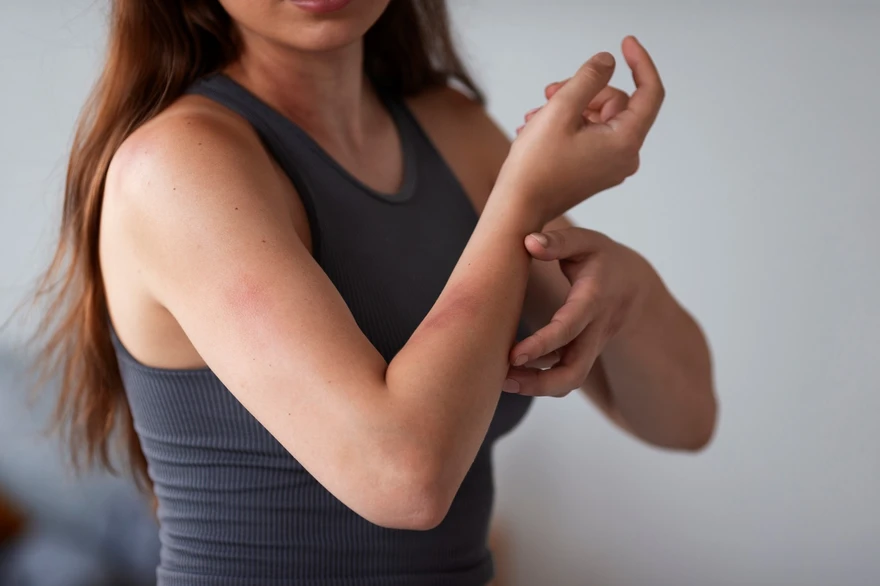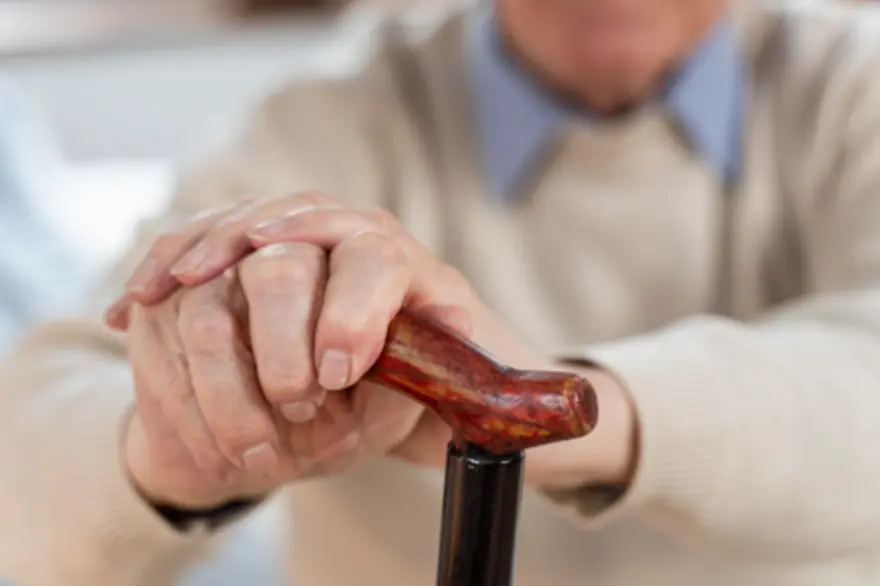RBS (Random Blood Sugar) Glucose Test
RBS (Random Blood Sugar) Glucose Test Details in Brief
| Also Known As | Glucose Random, Fluoride Plasma |
|---|---|
| Purpose | Helps in screening for and monitoring diabetes mellitus and other glucose metabolism disorders. |
| Preparation | No special preparation required |
| Fasting | Not required |
| Reporting Time | After 6 hours |
| Cost | 100 |
What Is an RBS (Random Blood Sugar) Glucose Test?
A random blood sugar test, or RBS test, is a simple blood test that measures the amount of glucose (sugar) in your blood at any given time of the day. Unlike other blood sugar tests, you don't need to fast or schedule it at a specific time, making it convenient for quick screening.
The test uses a venous blood sample, typically collected into a fluoride vacutainer to prevent glycolysis. It helps detect high blood sugar (hyperglycaemia) or low blood sugar (hypoglycaemia), which are key indicators of diabetes and other glucose metabolism disorders.
What Does the RBS (Random Blood Sugar) Glucose Test Measure?
The RBS test provides valuable information about your body's ability to manage blood sugar levels:
- Measures glucose concentration in your blood at the time of testing.
- Detects hyperglycaemia (high blood sugar levels)
- Identifies hypoglycaemia (low blood sugar levels)
- Monitors how well diabetes treatment is working
- Provides quick screening for glucose metabolism disorders.
- Helps assess how your body responds to food intake, stress, or medications that affect glucose levels
RBS (Random Blood Sugar) Glucose Test: Who Needs It and Why It's Done
What Symptoms May Call for an RBS (Random Blood Sugar) Glucose Test?
Your doctor may recommend an RBS test if you experience any of these common diabetes symptoms:
- Frequent urination, especially at night
- Excessive thirst that doesn't go away
- Increased hunger even after eating
- Unexplained weight loss
- Blurred or changing vision
- Extreme tiredness or weakness
- Slow-healing cuts or sores
- Numbness or tingling in hands or feet
Who Should Get an RBS (Random Blood Sugar) Glucose Test?
Several groups of people benefit from regular RBS testing:
- People showing symptoms of high or low blood sugar.
- Individuals with a family history of diabetes.
- Those who are overweight or obese
- People with high blood pressure
- Women with PCOS (Polycystic Ovary Syndrome)
- Individuals leading sedentary lifestyles
- Patients already diagnosed with diabetes for monitoring
- Anyone undergoing routine health check-ups.
Why Is an RBS (Random Blood Sugar) Glucose Test Done?
The RBS test serves as a quick and convenient screening tool that provides immediate information about your blood sugar levels, especially useful in emergencies or when fasting tests aren't practical.
Importance of an RBS (Random Blood Sugar) Glucose Test
The RBS test plays a crucial role in diabetes management and prevention. Its main advantage lies in its simplicity – no fasting required, making it accessible anytime. For diagnosis, significantly high RBS levels prompt doctors to order confirmatory tests like HbA1c or fasting blood sugar.
For treatment monitoring, it helps patients and clinicians make timely adjustments to medication, diet, or exercise plans based on glucose trends. Early detection through RBS testing helps prevent serious complications like heart disease, kidney damage, and nerve problems that can result from uncontrolled diabetes.
RBS (Random Blood Sugar) Glucose Test Booking & Reports – Metropolis Healthcare India
How to Book an RBS (Random Blood Sugar) Glucose Test?
- Simple Online Booking
Booking can be done via the Metropolis Healthcare App or website. Select 'RBS (Random Blood Sugar) Glucose Test', choose a convenient time slot, and provide your address for a blood test at home. You can also visit the nearest Metropolis Lab if you prefer to give your sample directly. - Safe Home Sample Collection
Our trained phlebotomists ensure the timely collection of your sample while strictly following all safety and hygiene protocols. - Sample Tracking Updates
Stay informed at every step. From collection to testing, you can track your sample directly through the Metropolis Healthcare website. - Accurate Laboratory Testing
Your sample is processed at our NABL- & CAP-accredited laboratories, where expert technicians ensure accurate results. - Quick & Easy Reports
Receive your test reports promptly via email, WhatsApp, or by downloading them directly from the Metropolis Healthcare website or app.
Is Home Sample Collection for the RBS (Random Blood Sugar) Glucose Test Available Near You?
Yes, home sample collection for the RBS test is widely available across India through Metropolis Healthcare. Our trained phlebotomists visit your home at your preferred time, ensuring safe and hygienic blood collection. With our extensive network of over 10,000 touchpoints across India, we're committed to providing reliable, accurate testing services wherever you are, maintaining the same high standards of safety and precision you'd expect from our laboratories.
How Long Does It Take to Get an RBS (Random Blood Sugar) Glucose Test Report?
Reports are usually available within 6 hours once the sample reaches the lab.
Where Can I See or Get the RBS (Random Blood Sugar) Glucose Test Results?
Test results from Metropolis Healthcare can be accessed through multiple convenient channels. You can log in to the Metropolis website using your credentials or use the Metropolis Healthcare App to view and download your reports. Additionally, test reports are sent via email or WhatsApp, and you also have the option to collect a physical copy directly from the lab.
Interpreting RBS (Random Blood Sugar) Glucose Test Results
What Your RBS (Random Blood Sugar) Glucose Test Results May Indicate
The table below shows how to understand your RBS test results and what different glucose levels might mean for your health:
|
Parameter |
Reference Range |
High Values May Indicate |
Low Values May Indicate |
|
Glucose Random |
Diabetes mellitus: ≥200 mg/dL (on more than one occasion) |
Extremely high glucose levels (≥400 mg/dL) are critical and require urgent medical evaluation for diabetic ketoacidosis or hyperosmolar state. Also indicates the presence of diabetes mellitus, stress, certain medications, and pancreatic disorders. |
Low values may occur due to insulin overdose, liver disease, prolonged fasting, malnutrition, or adrenal insufficiency. For infants, low glucose levels can be life-threatening and require urgent care. |
Conditions that May Affect RBS (Random Blood Sugar) Glucose Test Accuracy
Several factors can influence your RBS test results and should be discussed with your doctor:
- Certain medications, like steroids, diuretics, and some blood pressure medicines, can raise glucose levels.
- Dehydration can concentrate blood substances, potentially showing falsely high readings.
- Recent illness, infection, or physical stress may temporarily elevate blood sugar.
- Intense exercise immediately before testing can lower glucose results.
- Some medical conditions, like liver or kidney disease, can affect glucose metabolism.
- Pregnancy hormones may influence blood sugar levels.
How Is an RBS (Random Blood Sugar) Glucose Test Done?
The random blood sugar test involves a simple blood collection process that takes just a few minutes:
- A healthcare professional cleans the area on your arm, usually inside your elbow.
- A small needle is inserted into a vein to collect blood into a fluoride tube.
- The blood sample (2 ml) is collected in a fluoride vacutainer to inhibit glycolysis and preserve glucose stability.
- Gentle pressure is applied to stop any bleeding after needle removal.
- The sample is labelled and sent to the laboratory for analysis using the hexokinase method.
- The sample is sent to the laboratory for analysis using the hexokinase enzymatic method, and results are available within 6 hours.
How Should You Prepare for an RBS (Random Blood Sugar) Glucose Test?
Preparing for an RBS test is straightforward since no special preparation is required:
- No fasting is required; you can eat and drink normally before the test.
- Continue regular medications unless your doctor advises otherwise.
- Stay well hydrated, by drinking adequate water before the test.
- Inform your doctor about all medications you're currently taking.
- Mention any recent illness or stress that might affect results.
- Wear comfortable clothing with sleeves that can be easily rolled up.
Diseases that an RBS (Random Blood Sugar) Glucose Test Can Help Detect
The RBS test serves as an important screening tool for various glucose-related conditions:
- Type 1 diabetes mellitus
- Type 2 diabetes mellitus
- Gestational diabetes (usually screened with OGTT, but RBS may provide preliminary assessment)
- Prediabetes or impaired glucose tolerance
- Hypoglycaemia (low blood sugar)
- Pancreatic disorders affecting insulin production
- Metabolic syndrome
- Insulin resistance conditions
RBS (Random Blood Sugar) Glucose Test/Packages that You Can Book With Metropolis Healthcare
Here are related glucose tests and packages available through Metropolis Healthcare that complement the RBS test:
|
Test/Package Name |
Purpose/Highlights |
|
Measures blood sugar levels 2 hours after eating. |
|
|
Measures fasting blood glucose after 8–12 hours of fasting. |
|
|
Detects glucose presence in a urine sample. |
RBS (Random Blood Sugar) Glucose Test Prices in Different Cities
The RBS test price may vary depending on your location. Here's a table showing the approximate prices in different cities.
|
City |
Price (INR) |
|
₹50 - ₹100 |
|
|
₹50 - ₹100 |
|
|
₹50 - ₹100 |
|
|
₹50 - ₹100 |
|
|
₹50 - ₹100 |
|
|
₹50 - ₹100 |
Reference:
• Tietz Fundamentals of Clinical Chemistry and Molecular Diagnostics. 8th edition. Edited by CA Burtis.
RBS (Random Blood Sugar) Glucose Test Price
Metropolis Healthcare is a leading diagnostics centre and pathology lab in India equipped with the latest state-of-the-art technologies that provides the RBS (Random Blood Sugar) Glucose Test with a clear pricing structure.
The RBS (Random Blood Sugar) Glucose Test Price in Mumbai is ₹ 100 .
We are committed to deliver accurate and quality results from the best labs in India with complete transparency regarding test cost and turnaround time. No matter where you are, we strive to offer patients high-quality service that is affordable and accessible.
Frequently Asked Questions
There's no specific best time for RBS testing. The main advantage is that it can be done anytime during the day or night, regardless of when you last ate, making it very convenient.
No, fasting is not required for RBS testing. You can eat and drink normally before the test, which makes it different from fasting blood sugar tests that require 8–12 hours of fasting.
Yes, dehydration can concentrate your blood, potentially leading to falsely elevated glucose readings. It's advisable to stay well-hydrated before taking any blood test, including the RBS test, for accurate results.
No special RBS test preparation is needed; eat your regular meals. However, inform your doctor about all current medications, as some drugs like steroids can affect blood sugar levels significantly.
A trained phlebotomist cleans your arm, inserts a small needle into a vein, and collects blood into a fluoride tube. The entire process takes less than five minutes and is generally painless.
An RBS test procedure has minimal risks similar to any blood draw. You might experience slight pain during needle insertion, minor bruising, or soreness at the collection site. Serious complications are extremely rare.
Normal RBS levels are below 200 mg/dL. Levels of 200 mg/dL or higher with symptoms suggest diabetes, while 140-199 mg/dL may indicate prediabetes requiring further evaluation by your doctor.
Ratings & Reviews (0)
Why Metropolis?
Metropolis has a team of 200 senior pathologists and over 2000 technicians delivering diagnostic solutions in the areas of routine, semi specialty and super specialty domains like Oncology, Neurology, Gynaecology, Nephrology and many more.
We offer a comprehensive range of 4000+ clinical laboratory tests and profiles, which are used for prediction, early detection, diagnostic screening, confirmation and/or monitoring of the disease.





















 WhatsApp
WhatsApp